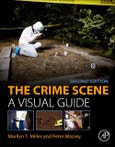The Forensic Crime Scene: A Visual Guide, Second Edition presents knowledgeable chapters on crime scene investigation, the various types of documentation, scene reconstruction, and the value of evidence and proper evidence collection. Additionally, a companion site hosts video and additional instructional materials. The primary goal of this book is to provide visual instruction on the correct way to process a forensic crime scene. By using photographs and video clips to show proper vs. improper procedures, the reader will be able to identify the correct principles required to process a scene.
Please Note: This is an On Demand product, delivery may take up to 11 working days after payment has been received.
Table of Contents
1. Forensic Scene Investigation 2. First Responders, Legal Concerns, Scene Security, Safety and Preliminary Scene Survey 3. Forensic Scene Documentation-Videography 4. Forensic Scene Documentation-Photography 5. Forensic Scene Documentation-Measuring and Sketching 6. Enhancement, Visualization, and Presumptive Testing 7. Forensic Scene Reconstruction 8. Evidence and Its Probative Value 9. Evidence Collection 10. Evidence Packaging 11. Evidence Preservation 12. Technology 13. Concluding Thoughts
Authors
Marilyn T. Miller Department of Forensic Science, Virginia Commonwealth University, USA. Marilyn Miller is a graduate of Florida Southern College with a bachelor's degree in chemistry. She earned a master's degree in forensic chemistry from the University of Pittsburgh and a Doctorate in Education from Johnson & Wales University in post-secondary educational leadership. Miller is a tenured, associate professor in the Department of Forensic Science at Virginia Commonwealth University. As a post-secondary educator for almost twenty years, she teaches a wide variety of forensic science and crime scene investigation classes to both forensic science and criminal justice majors at the undergraduate and graduate levels. She is a Fellow in the Criminalistics section of the American Academy of Forensic Science, the Southern Association of Forensic Scientists and the American Chemical Society. Miller is a former faculty member at the University of New Haven and the Henry Lee Institute of Forensic Science/ National Crime Scene Training Center. She has presented and taught as part of hundreds of forensic seminars across the United States and foreign countries. She is the author or co-author for several textbooks or chapters concerning crime scene investigation or reconstruction and forensic science. Before coming to VCU, she worked as a supervisor and forensic scientist for law enforcement agencies in North Carolina, Pennsylvania and Florida. She has testified over 400 times in county, state and federal courts of law as an expert witness in the field of forensic sciences and crime scene reconstruction. She has participated in hundreds of crime scene investigations, both as an active investigator. Currently, she also serves as a consultant for both prosecutors and defense attorneys. Miller designed, opened and operated crime scene units and forensic laboratories on the West Coast of Florida for over ten years. Peter Massey University of New Haven, West Haven, CT, USA.Peter Massey embodies the true essence of what UNH strives for in an educator by combining a forensic science educational background with significant work and life experience in the practical application of his profession as a patrolman and detective. Peter brings this training, skills and experience to his students allowing him the ability to enhance his lessons with first-hand knowledge and real-world application.
Peter Massey began his career in 1983 as a police officer with the Hamden, Connecticut Department of Police Services. Initially assigned to the Patrol Division, he rose to the rank of Detective within the Detective and Identification Divisions where he earned four Letters of Recognition, eight Certificates of Commendation and two Unit Citations. His work included the investigation of various crime scenes from thefts and robberies, assaults, suspicious deaths and homicides, as well as other major crime scenes. After completing over twenty years of service, Peter retired to become the Training Coordinator for the National Crime Scene Training and Technology Center at the Henry C. Lee Institute of Forensic Science. During his tenure as Training Coordinator, he was responsible for offering hundreds of advanced training courses to the law enforcement community. These courses included; Basic, Intermediate, and Advanced Crime Scene; Shooting Reconstruction; Blood Patterns Analysis; and Recovery of Human Remains.
A member of several professional organizations, he has been a consultant for and appeared on the "On the Case with Paula Zahn television show. He has traveled to the Bahamas, Mexico, and extensively throughout the United States to various Police Departments to train their patrolmen, detectives and investigators in the proper techniques used as first responders and crime scene investigators. Other specialty topics include shooting reconstruction, blood spatter pattern analysis, trace evidence, and finger printing.
At UNH, Peter has taught several investigation courses in the Criminal Justice Department and is currently a Lecturer for the Forensic Science Department, teaching Crime Scene Investigation, Advanced Crime Scene Investigation, and Introduction to Forensic Science.
Peter received his MSc degree from the University of New Haven in Forensic Science -Criminalistics and is currently pursuing his Ph.D. in Criminal Justice. His dissertation will focus on crime scene training.
Peter has been qualified in court and is actively engaged in both criminal and civil cases throughout the United States as an expert witness in the area of crime scene reconstruction, crime scene investigation, and fingerprint comparison.
Peter is currently the project manager on a NIJ grant entitled "The Impact of Forensic Evidence on Arrest and Prosecution."
He has also been a co-author on a chapter on handling of forensic botany evidence in Forensic Ecology Handbook: From Crime Scene to Court. Peter's interests include examining the value of standardization of crime scene investigation training and methods and new technological advancements in crime scene investigation.








